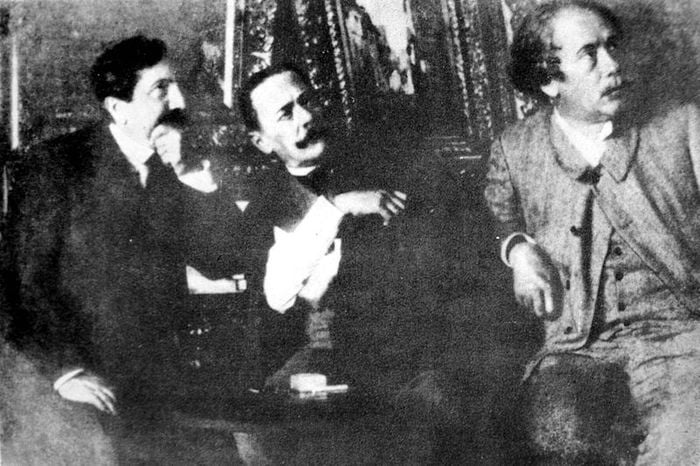What followed must have undoubtedly filled the driver with respect. The young passengers were two students, one of philosophy, the other of medicine; they were returning to amuse themselves in their native town. They embarked upon a violent academic discussion upon crime and its causes, and, to give him his due, the medical student was better informed than the philosopher.
Atavism; alcoholism and its pathological consequences; defective birth; deformity; Paludism; then nervous disorders! Such and such conquest of modern science—but the case of reversion to type! Darwin, Hackel, Lombroso. At the case of reversion to type, the driver opened wide his eyes in which shone a profound admiration for the conquests of modern science.
Criminal proper
“It is obvious,” added the medical student. “The so-called criminal proper, taken as a type, has unusually long arms, and very short feet, a flat and narrow forehead, and a much developed occiput. To the experienced eye his face is characteristically coarse and bestial; he is rudimentary man: he is, as I say, a beast which has but lately got used to standing on its hind legs only, and to raising its head towards the sky, towards the light.”
At the age of twenty, after so much excitement, and after a good repast with wine so well vinted and so well matured as Leiba`s, a phrase with a lyrical touch came well even from a medical student.
Between his studies of Darwin and Lombroso, the enthusiastic youth had found time to imbibe a little Schopenhauer—“towards the sky, to-wards the light!”
Leiba was far from understanding these “illuminating” ideas. Perhaps for the first time did such grand words and fine subtleties of thought find expression in the damp atmosphere of Podeni. But that which he understood better than anything, much better even, than the speaker, was the striking illustration of the theory: the case of reversion to type he knew in flesh and blood, it was the portrait of Gheorghe. This portrait, which had just been drawn in broad outline only, he could fill in perfectly in his own mind, down to the most minute details.
The coach had gone. Leiba followed it with his eyes until, turning to the left, it was lost to sight round the hill. The sun was setting behind the ridge to the west, and the twilight began to weave soft shapes in the Podeni valley.
Gloomy innkeeper
The gloomy innkeeper began to turn over in his mind all that he had heard. In the dead of night, lost in the darkness, a man, two women and two young children, torn without warning from the gentle arms of sleep by the hands of beasts with human faces, and sacrificed one after the other, the agonized cries of the children cut short by the dagger ripping open their bodies, the neck slashed with a hatchet, the dull rattle in the throat with each gush of blood through the wound; and the last victim, half-distraught, in a corner, witness of the scene, and awaiting his turn. A condition far worse than execution was that of the Jew without protection in the hands of the Gentile—skulls too fragile for such fierce hands as those of the madman just now.
Leiba`s lips, parched with fever, trembled as they mechanically followed his thoughts. A violent shivering fit seized him; he entered the porch of the inn with tottering steps.
“There is no doubt,” thought Sura, “Leiba is not at all well, he is really ill; Leiba has got `ideas` into his head. Is not that easy to understand after all he has been doing these last days, and especially after what he has done to-day?”
He had had the inn closed before the lights were lit, to remain so until the Sabbath was ended. Three times had some customers knocked at the door, calling to him, in familiar voices, to undo it. He had trembled at each knock and had stood still, whispering softly and with terrified eyes:
“Do not move—I want no Gentiles here.”
Read More about Explore Burgas








